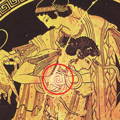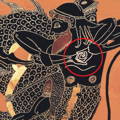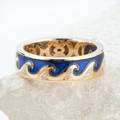+1 (862) 222-0442 (EST)
The Meander: Greek Key, Ropes, and Argonauts
The Border Symbol
.
The river’s winding course gave rise to the term "meander" in Greek, then English, which refers to a winding or intricate path.
Meanders are is used as decorative borders in Greek art and symbolize the eternal flow of life with its continuous lines.

Shown: Peleus
Peleus defeats the serpents: This depiction shows Peleus defying the serpents of divine transformation that bite him everywhere. Peleus defeats the transformations with the sacred "grip", or "Meander", the famous ancient Greek symbol of victory over the gods.

Shown: Hercules battle with Triton
Argonaut Meander
Although the "Greek Key" (above) is far and away the most popular type of meander, it is not the only one. Actually there are dozens, many of which can be found on this site. The most popular of these is probably the Argonaut which is a series of waves (shown here).
The "Argonaut" is named for the legend of Jason and the Argonauts who sailed across the Black Sea in search of the Golden Fleece.


Rope Meander
This pattern resembles intertwined ropes or braids, creating a continuous and intricate design. The rope meander symbolizes strength, unity and interconnectedness. It has been used to adorn pottery, textiles, and architectural elements, showcasing the craftsmanship and artistic sophistication of the cultures that employed them. It serves not only as a decorative element, but also carries cultural and symbolic meanings reflective of its time and context.









